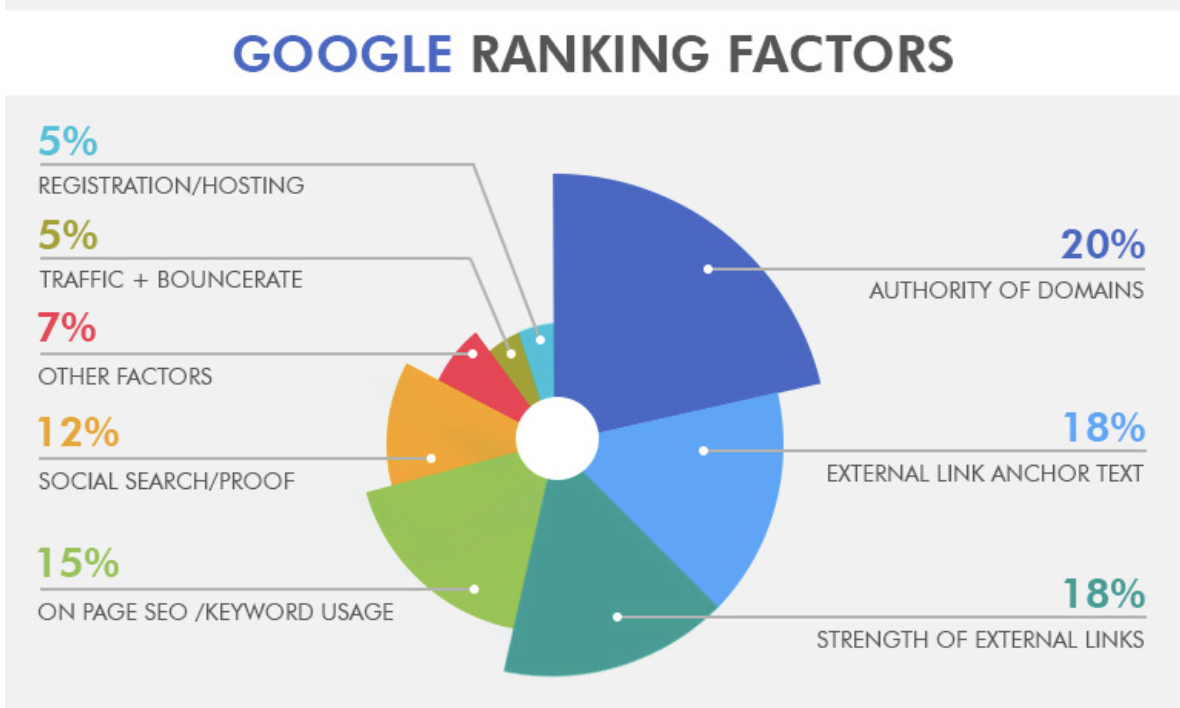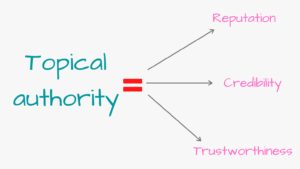News and Insights
Domain Authority vs Topical Authority
January 3, 2023
Domain authority and topical authority are two key SEO ranking factors that determine a website’s search engine scores.
But do you know what each of them means?
How do they compare?
Is one more important than the other?
We’ve written this blog post to provide you with an understanding as to what each of these amounts to, so you could become the go-to website (or resource) for your customers.
What Is Domain Authority?
Domain Authority is a ranking factor that tells Google how authoritative a particular domain is.
It is a score that combines the strength of backlinks to other parameters related to your website like the age of the domain, trustworthiness, social signals, etc.
While the term “Domain Authority” is usually associated with the Moz metric by the same name, it should not be confused with ‘domain authority’ as a ranking factor.
The parameters used by Moz to give a DA score to each domain do not always correlate with the authority that Google places on each of the domains they crawl.
How To Improve Domain Authority
While we do not exactly know all the parameters that go into determining the authority of a particular domain, here are some factors that have a strong influence on how much authority Google places on a particular website.
- Domain age — Older domains have more authority than newer ones because they have established themselves (relatively) as a trusted brand.
- Backlink profile – A domain that is linked from powerful websites of high authority is, in turn, seen as one with high authority
- The number of pages indexed by Google — More pages indexed could mean higher authority for your site; although this may not always be true
- Branded searches on Google – Popular brands that enjoy a large volume of branded searches also enjoy high domain authority for their industry
- Branded anchors – Domains that receive a significant number of organic branded anchors enjoy higher domain authority.
There is no shortcut to improving your domain authority.
It’s a long arduous process that involves building organic backlinks, and adding top-quality content to your website consistently over many months, or even years.
Invest in all the right SEO best practices – both technical and offline SEO – to see your domain authority grow.
This includes investing in the right link-building techniques, producing the right kind of content, fixing redirection and broken link errors in your website, and so on.
In a way, SEO and domain authority feed off each other.
The right SEO techniques help improve domain authority of your website.
In turn, a good domain authority helps with your SEO and makes it easier to rank for your chosen keywords over time.
What Is Topical Authority?
Topical Authority is a measure of how authoritative a website is with respect to a very specific topic.
For instance, if you have a pet website where you talk about everything related to dogs — the breeds, what food to feed, what games to play, how to groom dogs, etc. — then while you may have top-quality articles on each subject, you do not demonstrate your expertise in any of these various topics.
Instead, if you focus on a particular sub-niche within the topic of pets (say pet insurance), and have articles on every conceivable topic related to pet insurance, then it is likely that Google views your domain as an expert when it specifically comes to ‘pet insurance’, even though you may not enjoy other metrics that qualify your domain as authoritative.
It is however important to note that topical authority trumps domain authority only in certain cases.
If you cover a YMYL topic (‘Your Money, Your Life’ – topics that relate to the health or finances of your reader), then chances are that Google would err on the side of caution and rank a domain with higher authority even though your smaller domain is a topical expert.
How To Improve Topical Authority?
It can take a website months, or even years, to gain high domain authority.
However, it is relatively easier to secure good topical authority. This can be achieved with the help of well-planned topic clusters.
The best way to go about this is to identify a subtopic within your niche that has not been exhaustively covered by competitors in your industry.
Once you make sure that this does not fall in any of the YMYL topics, you may go about producing an exhaustive list of top-quality content.
The final step in this process is to interlink between these different articles for Google to effectively navigate and interpret the context of each of these articles.
Once you have effectively covered a subtopic, you may rinse and repeat with other similar clusters within the broader niche.
It takes websites a relatively shorter time (several weeks to months) to attain topical expertise when compared to gaining domain authority.
Which Is Important For Your Website?
Both are important.
When you are starting a new website, then it can be several months or even years before you gain top domain authority.
So start with topical authority. Pick a small sub-niche within your industry and be the ultimate expert on this topic. These are called ‘topic clusters’.
Once you have exhaustively covered it, expand the horizon a bit and cover another topical cluster — and over time you will gain topical authority in several sub-niches within the main industry.
Also, when you attain topical authority, you are likely to rank high for keywords even if you do not have sufficient authority yet.
This helps you attain organic backlinks which helps you build your domain authority over time.
Final Word
Both domain authority and technical authority play a vital role in determining the success of your SEO efforts.
The scores that Google assigns to websites are intended as a gauge of authority. It determines more than just how many links point to a domain.
Google also analyses the content quality of that website, how users engage with them, whether they are helpful and answer the question, and so on.
As such, neither domain authority nor topical authority is more important than the other.
They work in tandem with each other to help you rank well in search engine results pages.
However, for businesses that are actively building their presence online and have not yet built up a significant following, topical authority is an important first step to building a content strategy.
But, if a business has an established website with an excellent amount of content relevant to their industry or niche, domain authority is going to be more important.
When this is the case, quality backlinks can help improve your website’s overall topical authority, thus putting you in a better position on highly competitive search terms.
Want to improve the SEO performance of your website?
At MintTwist, our SEO agency works with clients to improve their organic performance and achieve sustainable growth. For some quick learnings, check out our top SEO tips. For more consultancy and ongoing support, get in touch today.
TAGS:

